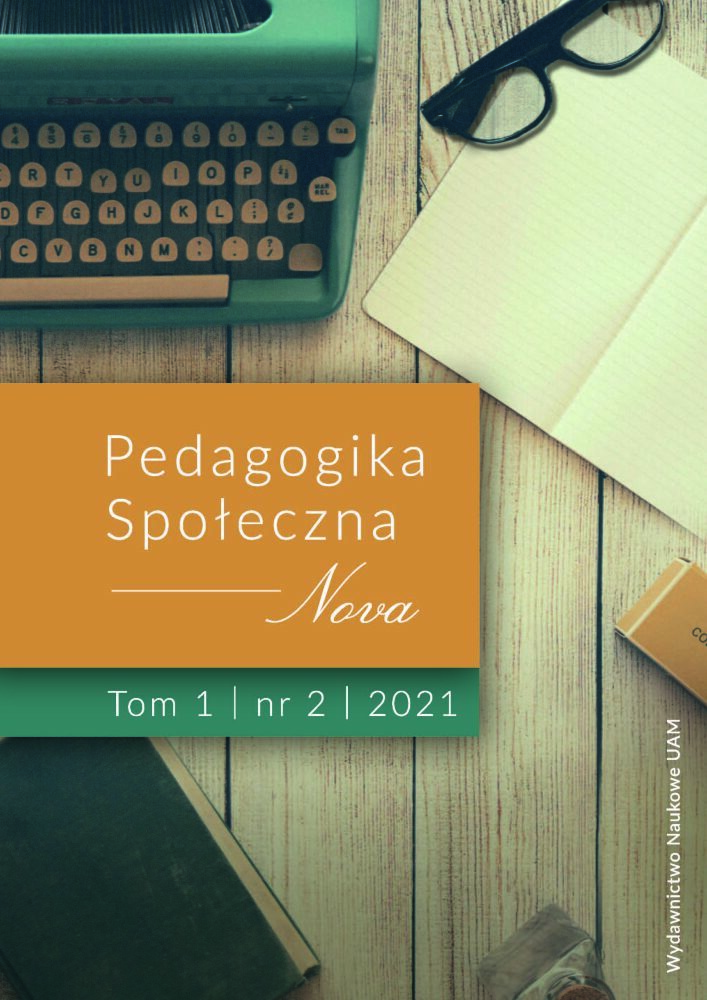Abstract
The paper presents initiative of making a diagnosis of the situation in education during pandemic time and the fruits of if which are the diagnostic picture of the environmental needs and projects of changes in education in a local environment – one of the parishes in the Silesia district. The paper describes the process of the realization of social engaged scientific research in a local environment, which is based on the influence of specific trauma for the readiness to undertake scientific reflection on the situation in education and the needs in this area but also based on the willingness of making changes in the reality of the local education. So, the article is an attempt to present possibilities to use difficult experiences of the online education forced by the pandemic reality for making constructive changes in a local context. It presents tendencies and phenomena of changes that can be observed in many local environments and educational institutions as positive consequences of the difficult situation of the pandemic education. Moreover, it is an attempt of presenting a good example of the partner collabora- tion social-local and scientific environments, directed for changing the environment and the reality of the education into the ones that are the better contexts of individual and over individual development. So it may be said that the paper is a narration about the possibility of social influence of researchers, about socially engaged research. The paper presents the both the beginnings, the process and some results of the diagnosis but also worked out in a dialog with local authorities recommendations and proposals of changes.
References
COVID-19 Benefits Survey, maj 2020, https://www.willistowerswatson.com/en-US/Insights/2020/05/2020-covid-19-benefits-survey [dostęp: 25.08.2021].
Bieganowska-Skóra A., Pankowska D., Moje s@mopoczucie w e-szkole. Raport z badań, Lublin 2020, https://www.umcs.pl/pl/informacje-prasowe,4623,raport-moje-samopoczucie-w-e-szkole-,96204.chtm [dostęp: 20.05.2021].
Błaszczak I., Rowicka A., Wypalenie zawodowe nauczycieli. Prezentacja wybranych koncepcji i badań, „Studia z Teorii Wychowania” 2019, nr 2 (27).
Bolstad R., The Role and Potential of ICT in Early Childhood Education. A Review of New Zealand and International Literature, New Zealand Council of Educational Research, Wellington 2004.
Całek G., Rodzice o koronaedukacji – wnioski z ankiety, „Szkoła. Miesięcznik Dyrektora” 2020, sierpień, https://grzegorzcalek.pl/wp-content/uploads/2020/09/Rodzice-o-koronaedukacji-wnioski-z-ankiety–Grzegorz-Calek.pdf [dostęp: 29.08.2021].
Domagała-Zyśk E. (red.), Zdalne uczenie się i nauczanie a specjalne potrzeby edukacyjne. Z doświad- czeń pandemii COVID-19, Lublin 2020.
Grzelak S., Żyro D., Jak wspierać uczniów po roku epidemii? Wyzwania i rekomendacje z obszaru wychowania, profilaktyki i zdrowia psychicznego, Warszawa 2021, http://www.parpa.pl/images/file/2020.03.23_Raport MEN_Profilaktyka.pdf [dostęp: 29.08.2021].
Huang Q., Examining Teachers’ Roles in Online Learning, „The EUROCALL Review” 2018, vol. 26, nr 2.
Huett J., Kalinowski K.E., Moller L., Huett K., Improving the Motivation and Retention of Online Students Through the Use of ARCS-Based E-Mails, „American Journal of Distance Education” 2008, 22 (3).
Jaskulska S., Jankowiak B., Rybińska A., Obraz kształcenia na odległość w Polsce w czasie pandemii CO- VID-19 w opiniach nauczycielek i nauczycieli wychowania przedszkolnego. Raport, Poznań 2020, https://ja-nauczyciel.pl/news/pandemia-w-przedszkolach-raport-z-badan/ [dostęp: 05.09.2021].
Keller J.M., Suzuki K., Learner Motivation and E-learning Design: a Multinationally Validated Process, „Journal of Educational Media” 2004, vol. 29, no. 3.
Lee S., Ward K.P., Chang O.D., Downing K.M., Parenting Activities and the Transition to Home-Based Education during the COVID-19 Pandemic, „Children and Youth Services Review” 2021, https://doi.org/10.1016/j.childyouth.2020.105585 [dostęp: 05.09.2021].
Nowak J., Edukacyjny potencjał dialogu w przestrzeni klasy szkolnej, [w:] H. Krauze-Sikorska, M. Kli- chowski, K. Kuszak (red.), Świat małego dziecka, t. II, Poznań 2013.
Nowak J., Metoda projektów a efektywność kształcenia na etapie edukacji wczesnoszkolnej, [w:] J. Grzesiak (red.), Ewaluacja i innowacje w dialogu. Ewaluacja w dialogu – dialog w ewaluacji, Kalisz–Konin 2008.
Nowotniak J., Ewaluacja edukacyjna. Społeczne światy ewaluatorów, Kraków 2019.
Plebańska M., Szyller A., Sieńczewska M., Edukacja zdalna w czasach COVID-19. Raport z badania, Wydział Pedagogiczny Uniwersytetu Warszawskiego, Warszawa 2020.
Plebańska M., Szyller A., Sieńczewska M., Raport – co zmieniło się w edukacji zdalnej podczas trwania pandemii? – Wydział Pedagogiczny Uniwersytetu Warszawskiego, Warszawa 2021.
Poon J., Blended Learning: An Institutional Approach for Enhancing Students’ Learning Experiences, „Journal Of Online Learning And Teaching” 2013, 9 (2), s. 271–288, http://dro.deakin.edu.au/eserv/DU:30057995/poon-blendedlearning-2013.pdf [dostęp: 03.09.2021].
Popoola O. (2012), E-Learning and Motivation: A Multi-Faceted Investigation of Eleven to Fourteen Year Olds’ Attraction to Computer-Based Learning, and Their Motivational Responses to the Novelty and Nature of a Selection of Self-Study Computer-Based Learning Activities, University of East Anglia, Norwich 2012.
Ptaszek G., Stunża G.D., Pyżalski J., Dębski M., Bigaj M., Edukacja zdalna: co stało się z uczniami, ich rodzicami i nauczycielami?, Gdańsk 2020.
Pyżalski J. (red.), Edukacja w czasach pandemii wirusa COVID-19. Z dystansem o tym, co robimy obecnie jako nauczyciele, Warszawa 2020.
Pyżalski J. (red.), Wychowawcze i społeczno-kulturowe kompetencje współczesnych nauczycieli. Wybrane konteksty, Łódź 2015.
Raport Ministra Edukacji Narodowej. Zapewnienie funkcjonowania jednostek systemu oświaty w okresie epidemii COVID-19, MEN, Warszawa 2020, https://www.gov.pl/web/edukacja/raport-ministra-edukacji-narodowej-na-temat-funkcjonowania-szkol-i-placowek-oswiatowych-w-okresie-covid-19 [dostęp: 01. 02.2021].
Roehl A., Reddy S.L., Shannon G.J., The Flipped Classroom: An Opportunity to Engage Millennial Students Through Active Learning Strategies, „Journal of Family and Consumer Sciences” 2013, 105 (2), s. 44–49.
Steel C., Hybrid vs Blended Learning. The Difference and Why It Matters, „Leading Learning” 2021, https://www.leadinglearning.com/hybrid-vs-blended-learning/ [dostęp: 25.08.2021].
Tucholska S., Wypalenie zawodowe u nauczycieli. Psychologiczna analiza zjawiska i jego osobowościowych uwarunkowań (wyd. 2 popr.), Lublin 2009.

